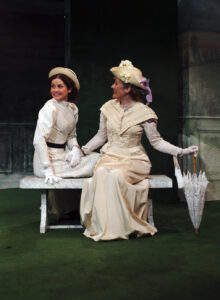Von Uta Buhr
AN OLD NEW PLAY OR A NEW OLD PLAY AT THE ENGLISH THEATRE OF HAMBURG: GEORGE BERNHARD SHAW’S “MRS WARREN’S PROFESSION

“What a scandal – how shocking indeed!” This might have been the mildest criticism with regard to George Bernhard Shaw’s play about prostitution in Queen Victoria’s puritanical Great Britain at the beginning of the 20th century. As it is, the play “Mrs Warren’s Profession”, written by the author in 1894, was staged in 1902 when the virtuous ruler – Queen of Great Britain and Ireland, Empress of India – had already been dead for a year. However, her high moral standards were still alive at all levels of society. What a cheek of a playwright – an Irishman at that – to stir up the hornet’s nest of dirt and prostitution which virtually did by no means exist at that time in the country. How daring! Anyway, under the severe theatre censorship of Her Majesty’s Lord Chamberlain the play was forbidden after its first performance. Later, when rules were a bit relaxed, Mrs Kitty Warren’s life as a “madam” of a string of brothels on the Continent became a great box-office success not only in Britain.
Nowadays hardly anybody in our Western countries will find anything scandalous about prostitution, the more so as a number of attractive female students – even young women from respectable families – prostitute themselves to make ends meet. Some of them even write books about their experiences in the “oldest profession in the world” and make a fair amount of money by doing so. Thus, prostitution is nothing to be proud of but, at the same time – as it seems – nothing any woman must be ashamed of either. In Mrs Warren’s day, however, the situation was still entirely different.
About the Play:
Miss Vivie Warren is enjoying a “chill out” in a lush green garden near Haslemere in Surrey after a hard term at Cambridge University. The young bright and pretty graduate meets her mother, elegant Mrs Kitty Warren, and learns that she owes her luxurious life to a number of brothels that her mum owns on the Continent. What a shocking revelation. No, Vivie is not at all amused. But being a pragmatic girl, she sympathises with her mother, taking her miserable upbringing into consideration. However, she expects Kitty to give up her “job” immediately and thus stop the exploitation of young poor girls. But Kitty does not even dream of abandoning her powerful, immensely profitable position. Both women part without even shaking hands. Vivie is determined to use her education to build up her own career in the business world.
This is the core of the plot. As a matter of fact, the play is populated by a couple of very different characters – such as the Reverend Samuel Gardner, a sweet-natured, but rather weak man who – by the way – turns out to be Vivie’s father! Two gentlemen who claim to be in love with the young woman – one in his twenties, the other one fifty plus – want to marry her. In Vivie’s opinion, young Frank is a charming good-for-nothing, whereas the other man, Sir Robert Crofts, strikes her as a brute and a scoundrel. The nicest man in the play, Mr. Praed, worships Vivie in a rather platonic way without bothering her with unpleasant proposals. In the end, Vivie gives in to none of them and chooses the harder way in her struggle for independence.
As already stated, this British classical written by one of the greatest playwrights in the English language, was banned from the stage in the early 20th century for its scandalous content. In our day it is applauded world-wide for its critical view of the status of women and the hypocrisy which still prevails in society. Shaw’s “Mrs Warren’s Profession” is in many ways a modern play which teaches us a lesson about some people’s high moral standards.
Final performance of “Mrs Warren’s Profession” on April 23, 2011
Tickets under phone number 040-227 70 89 – Further information: www.englishtheatre.de
Next premiere of “Rose’s Dilemma” – a comedy by Neil Simon – on May 5, 2011
